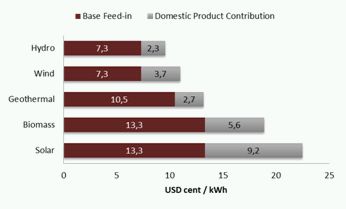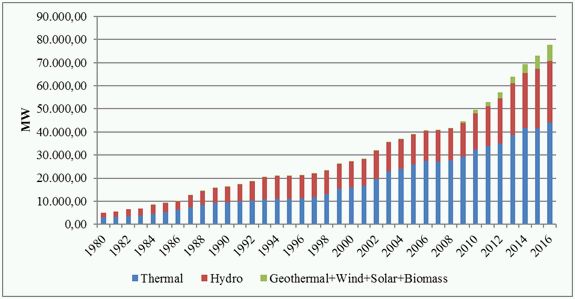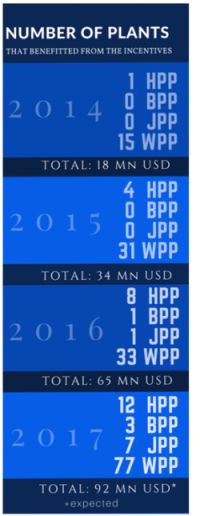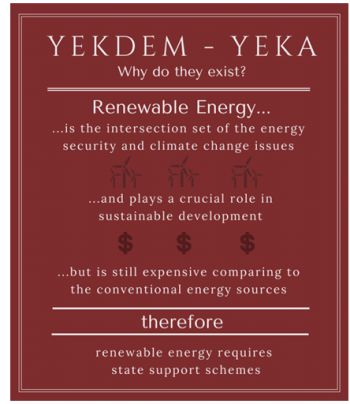An overview of the Renewable Energy Market
Renewable energy can be generated from a wide variety of sources including wind, solar, hydro, geothermal and biomass. Renewable energy sources have an increasing importance in the energy strategies of the energy importer countries considering that these are not only environmentally friendly but also have undeniable effects on minimizing dependence on the energy exporter countries. In other words, renewable energy sources have a vital role in both energy security and climate change struggles. Moreover, the renewable energy industry drives technological innovation and creates new employment opportunities. However, compared to the cost of conventional sources of energy, the prices of renewables are still high. Therefore, the industry is in need of support schemes which may vary from state to state. For sure, these support schemes should be time-limited and carefully designed since every intervention has distortion effects on the market, particularly on the market price. In addition, support schemes should be at the lowest possible cost for the taxpayers.
In order to attract the attention of the investors to the renewable energy market, Turkey enacted Law No. 5346 on the Utilization of Renewable Energy Resources for the Purpose of Generating Electrical Energy ("Renewable Energy Act") in 2005. The first version of the Renewable Energy act was not adequate enough to meet the needs of the market, so the Act was amended in 2011 to create a renewable energy sources support mechanism, known as YEKDEM. Amendments in the Act employed mainly a guaranteed feed-in tariff system along with some other incentives such as domestic manufacturing incentives and service charge exceptions, as reduction of land use charges and tax reductions.
Figure-1: RES Supports

By the end of 2016, the installed capacity of renewable energy in Turkey reached the amount of 34.582 MW, meaning that the share of renewable energy sources within the installed capacity was 44%. In 2016, the number of participants benefiting from the Renewable Energy Resources Support Mechanism reached 556, and the installed capacity of these participants was 15.083 MW.1
The year by year raise of the share of the renewable energy
sources in the total installed capacity can be seen from figure
2.
Figure 2: The Development of Installed Capacity According to Source by Years (MW)2

Domestic Manufacturing Incentive Schemes in YEKDEM and YEKA
As we mentioned before, the 2011 amendment of the Renewable Energy Act envisages additional tariffs for the investors that use locally produced mechanical and/or electro-mechanical components in renewable energy facilities for a period of five years. The additional tariffs vary according to the type of the energy and the type of the component as it can be seen from Schedule I and Schedule II of the Renewable Energy Act. The incentive ranges from US$0.04 to US$0.25 per kWh, depending on the type of plant and device. The standards and the certification process of the domestic manufacturing incentives are subject to the provisions of the Regulation on the Domestic Manufacture of the Components Used in the Generation of Electricity from Renewable Energy Resources ("Regulation"), which are extremely detailed and involve a complex certification process.
In 2014, only one hydro power plant and fifteen wind power plants benefitted from domestic manufacturing incentives. The number of the beneficiary PPs raised during the following years, and finally in 2017, twelve hydro power plants, three biomass power plant, seven geothermal power plants and 77 wind power plants benefitted from domestic manufacturing incentives. Even though the cost of the domestic manufacturing incentives rose from US$18.2 million to approximately US$92 million corresponding to the increase in the number of the beneficiary PPs, it is clear that the unit cost of the incentives drops sharply considering the effects of changes in foreign exchange rates.

On the other hand, the Minister of Energy, Mr. Berat Albayrak, declared that Turkish Renewable Energy Resources Support Mechanism (YEKDEM) will be replaced by a more competitive option, the Renewable Energy Resources Areas (YEKA) by 2020.3 YEKA is the new renewable support scheme of Turkey and its legal structure designed in the Regulation on Renewable Energy Resources Areas (YEKA Regulation) which came into force in 2016.4
The YEKA model depends on two main hallmarks in order to support Renewable Energy investments. The first is forming large scale renewable energy investment areas in order to make effective and efficient use of renewable energy sources, and the second is enabling high-tech equipment used in the generation facilities to be domestically manufactured or supplied and contribute to technology transfer. As a result, the supplemental role of the domestic manufacturing incentives in the YEKDEM model is transformed into a fundamental one by the YEKA model. The new support scheme will not only support renewable energy investments but also serve the industrial and regional development. Therefore, at a first glance it can be claimed that the new model is more favorable for those developing countries that try to create a domestic industry.
Unlike YEKDEM, under the YEKA Regulation use of domestically manufactured equipment is not an option for an additional tariff but an obligation. In other words, if it is understood that the domestic equipment committed is not used then there will be sanctions such as the termination of the contract and termination of the generation license.
Basically, YEKA depends on the YEKA usage right agreement which is signed by the winner of the tender and the Ministry of Energy. Under the YEKA regulation Art. 4/1(j) the definition of the "YEKA usage right" is the usage of YEKA land which has been developed by the administration and the assigned electricity connection capacity for the aforementioned land or usage of the connection capacity declared by the ministry within the scope of YEKA usage right agreement. YEKA usage right might be given in exchange of either the commitment to use domestic products or the commitment to domestic production of the electricity production plants components. On the other hand, the winner of the tender will have the right to sell the electricity produced in the YEKA land as a YEKDEM beneficiary with the tender price.
In summary, YEKA is a kind of renewable energy support scheme which requires a bundle of electricity production with domestic products. We should state that even though YEKA mainly depends on domestic products, it does not mean that foreign investors cannot compete in the tenders. As it seen in the Karapınar Tender Announcement, at least 25 percent of the shares of joint ventures must be owned by Turkish citizens in order to participate in the tender. In fact, a Turkish-foreign consortium of Kalyon-Hanwha Group ended up winning the tender bid, submitting the lowest offer of 6.99 cents per kilowatt-hour in the Karapınar SPP YEKA tender. Likewise, the Karapınar SPP YEKA tender, the Wind Energy Renewable Energy Resource Area tender was won by another Turkish-foreign consortium of Siemens, Türkerler and Kalyon.
On the other hand, keeping in mind the scale of the tender, the new support scheme might have some negative effects on the market. First, new system is not triggering the competition in the market; to the contrary, it is triggering the competition for the market. As a result, long term effects of the model might be the closing of the market to the providers of alternative technology in SPPs and WPPs. Second, the new model depends on the long-term contracts which means that Turkey will not reap the benefits of cost effective prospective technologies in renewable energy. In other words, Turkey has a risk to bear the additional costs of the long-term contracts. However, it might be named as the cost of technology transfer.
Conclusion

Renewable energy is the intersection set of the energy security and climate change issues, and it plays a crucial role in sustainable development. Even though the sharp drop in the marginal unit costs of the constructions of renewable energy PPs, it is still expensive compared to the conventional energy sources. Therefore, renewable energy requires state support schemes. YEKDEM and YEKA are both exemplifying one of those state support schemes for renewable energy investments. Bear in mind that these states' support schemes must be market friendly. YEKDEM worked well for a while considering that it really attracts a serious amount of investments to the renewable energy market, but due to the exchange rates it also became a heavy burden on the market. Moreover, in YEKDEM domestic product incentives is just an optional additional tariff. Contrary to the YEKDEM in YEKA, domestic product or production is an essential part of the package and it creates a "two birds with one stone" situation for the developing countries. In addition, the fifteen-year duration of YEKA and some other positive externalities of Turkey's "developing country" status including its growing demand for electricity and the exchange based price makes YEKA attractive for the foreign investors.
Last but not least, likewise in YEKDEM, it can be argued that the YEKA model also carries a potential risk as it might be deemed to be a contradictive method under the TRIMS Agreement and GATT, considering the decision of WTO5 regarding Canada's domestic content requirement for certain electricity generators utilizing solar photovoltaic and wind power technologies in the province of Ontario.
Footnotes
1. EMRA Electricity Market Sector Report 2016, p.iii.
2. EMRA Electricity Market Sector Report 2016, p.12.
4. For detailed information, See: "The Long Expected Regulation On Renewable Energy Designated Areas In Turkey" by Şahin Ardıyok, Tolga Turan and Can Yıldız.
5. See; WTOAppellate Body Reports concerning Cases No. WT/DS412/AB/R and WT/DS426/AB/R.
The content of this article is intended to provide a general guide to the subject matter. Specialist advice should be sought about your specific circumstances.


